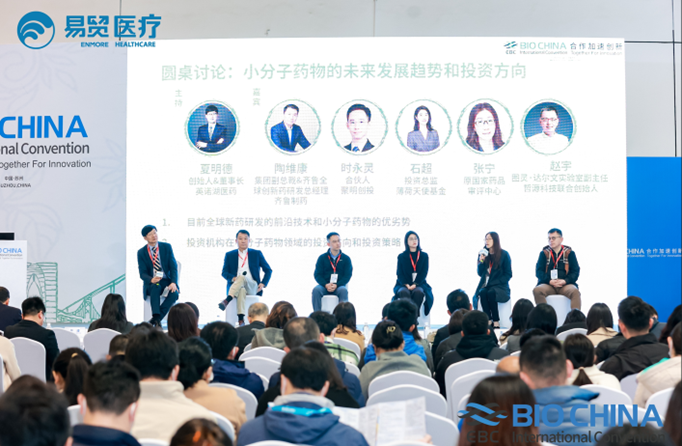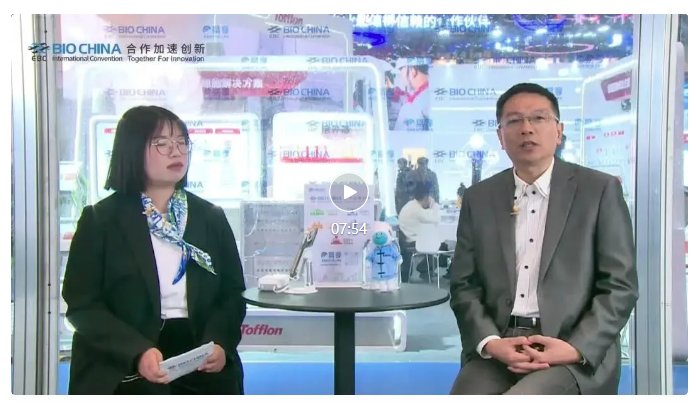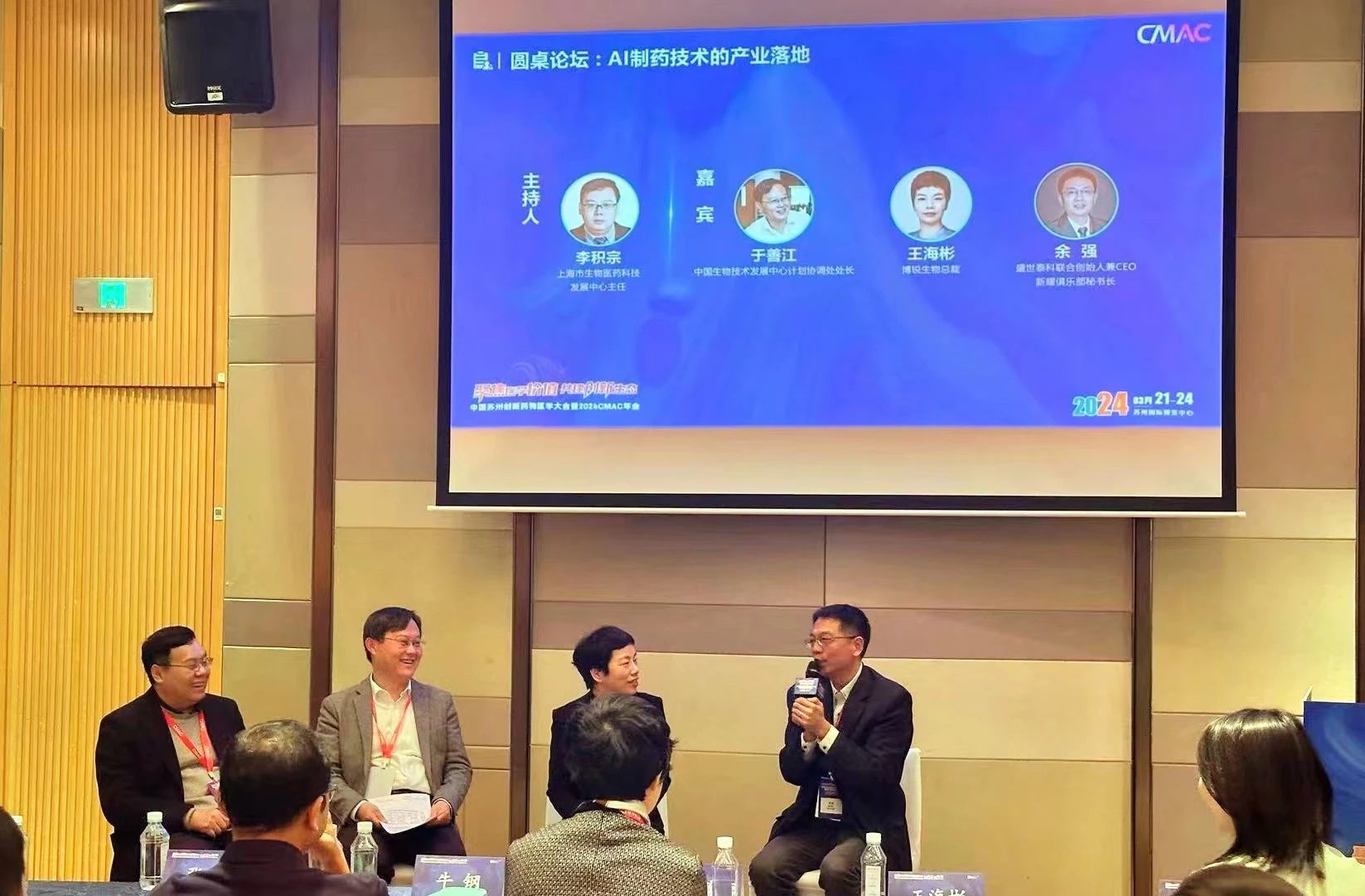Dr. Yu Qiang: Facing Industry Changes, Embracing the AI Future
Release date:
2024-03-22

Recently, the 9th EBC BIOCHINA (EBC) Yimao Bio-Industry Conference took place at the Suzhou International Expo Center. Dr. Yu Qiang, Founder and CEO of Shengshi Taike Innovation and Secretary-General of the Xinyao Club, attended the event and hosted the "Small-Molecule Innovative Drug R&D Forum." The forum特邀 over ten renowned industry leaders to jointly discuss cutting-edge technologies and emerging targets in small-molecule drug development, exploring with attendees how these molecules can continue to serve as a cornerstone for advancing future pharmaceutical research—and ultimately help better meet clinical needs.

After the event, Dr. Yu Qiang also participated in an exclusive interview with Yimao Live Studio, sharing his insights and engaging in discussions about his experience attending the conference, the company’s growth, and the future trends of the industry.

The following text is a later excerpt and compilation:
Yimao Live Stream: This is your how many time attending BIOCHINA this year? Could you please share the topic and key points of your presentation at this year’s event?
Yu Qiang : Last year, I participated as a sharing guest at Peking University’s Alumni Entrepreneurship Forum. This time, however, I’m attending as both the founder of Shengshi Taike and the Secretary-General of the Xinyao Club, collaborating exclusively with the Yimao Industry Conference to organize the "Small-Molecule Drug Innovation and R&D Thematic Forum." Today, March 14—the very day of the conference—is also a special occasion: it’s Pi Day (International Mathematics Day). Interestingly, the word "mathematics" in English originates from Greek, literally meaning "to learn whatever you do." That’s precisely why we’ve invited several outstanding industry leaders today to jointly explore cutting-edge technologies and emerging drug targets in small-molecule therapeutics. Together with our esteemed guests, we’ll delve into how small molecules can continue evolving alongside modern medicine, ensuring they play an increasingly vital role in meeting clinical needs effectively.
Yimao Live Stream: Over the past year, what changes have occurred in your industry, and what groundbreaking advancements has your company achieved?
Yu Qiang: The recent launch of the text-to-video model Sora has taken the ongoing buzz around generative AI to a whole new level. Meanwhile, AI is also revolutionizing the drug discovery and development field. Over the past year, numerous global pharmaceutical companies have made significant investments in AI technologies—ranging from equity stakes and collaborations with AI-driven drug firms to building their own internal R&D teams. Meanwhile, biotech companies are eager to leverage AI's cutting-edge capabilities to streamline the screening and optimization of drug candidates, accelerating the entire process of identifying and developing innovative new therapies.
Another significant shift comes from GLP-1 drugs, which have gained widespread attention—and even gone viral—thanks to their "miracle weight-loss" reputation. Recognizing the need for differentiated competition and improved patient adherence, companies are now exploring ways to transition GLP-1 therapies from time-consuming peptide-based injectable formulations to more convenient, small-molecule oral medications, thereby unlocking greater market potential. Currently, multinational pharmaceutical giants like Pfizer and Eli Lilly are boldly venturing into this "untapped territory," while several innovative domestic biotech firms are also making inroads—our company, for instance, already has a promising GLP-1 candidate in our R&D pipeline.
Meanwhile, in the highly competitive DPP-4 field—another popular target for blood sugar control that complements GLP-1—weaning our company’s decade-long, breakthrough new drug, Senglitin (formerly known as Shenglitin), which received acceptance of its marketing application by the National Medical Products Administration earlier last year. With the drug poised for launch, the company is also set to enter its commercialization phase.
Yimao Live Stream: How do you see the future development landscape of the biopharmaceutical industry?
Yu Qiang: The future development of the biopharmaceutical industry will likely follow these distinct trends:
First and foremost is the deep integration of information technologies, such as artificial intelligence (AI), into the biopharmaceutical sector. "AI + Biopharmaceuticals" is already making inroads across a variety of specialized fields—ranging from new drug development and medical image analysis to disease prediction and prevention, intelligent diagnostics, and precision medicine—and holds tremendous potential to reshape both biomedical research and the broader industry landscape.
Next, there’s the continuous evolution and adaptation of small-molecule technologies—this is precisely the topic we’ll be discussing today. In particular, thanks to the extensive exploration and growing application of artificial intelligence (AI) platforms in small-molecule drug discovery, researchers are now better equipped to identify novel targets for small-molecule inhibitors more efficiently, enabling rational drug design and ultimately accelerating the development of innovative therapies. As a result, small-molecule drugs will likely continue to play a significant role in future pharmaceutical R&D efforts.

When it comes to the exploration and application of artificial intelligence in the biopharmaceutical field, a sub-forum titled "Computational Medicine and Virtual Clinical Trials" was held today at the China Suzhou Innovative Drug & Medical Conference. The event brought together distinguished guests from government, industry, and hospital sectors to share insights and engage in discussions. During the roundtable session, Dr. Yu Qiang offered valuable advice on the industrial implementation of AI technologies and highlighted the importance of cross-sector collaboration.
He stated that the industrial implementation of AI technology is, First, it's necessary to accumulate a sufficient amount of high-quality data. High-quality data isn’t limited to just successful case studies—failure data can actually be even more valuable for drug development and clinical trials. At the same time, data must achieve "standardized writing, uniform track gauge for vehicles, consistent measurement systems, aligned ethical standards, and unified geographical domains." In the early stages of AI technology development, a wide variety of approaches emerged, but there is an urgent need to establish unified industry standards to enable data sharing. At the same time, standardized industry guidelines will also facilitate smoother collaboration and communication both within and across different sectors. Secondly, practical applications of the technology—such as virtual clinical settings— Requires approval from the National Medical Products Administration. So, we also need them to embrace these technologies as soon as possible. Finally, aside from national health insurance and patients, We also need to encourage commercial health insurance to cover the costs of products enabled by AI technology. For instance, the application of AI technology in disease prediction and prevention could enable more healthy individuals to purchase commercial health insurance.
When it comes to the cross-sector collaboration between AI technology and biomedicine, Dr. Yu Qiang believes that First, both parties need to develop a deep understanding of each other, fostering sufficient trust. Ultimately, driven by the shared benefits of business collaboration, they can achieve mutually beneficial cooperation. 。
